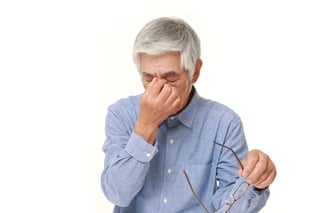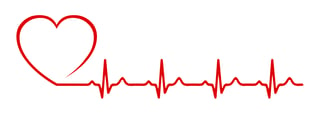
Have you ever noticed that when you are feeling anxious or stressed your heart rate increases and you start to breathe fast or hyperventilate? For people without lung disease these physiological symptoms of stress are easily dealt with and your body returns to its normal state as soon as you get yourself to calm down.
If you have COPD, hyperventilation can trigger a COPD exacerbation that will land you in the emergency room. To control your COPD symptoms, relaxation needs to become part of your daily life.
the emergency room. To control your COPD symptoms, relaxation needs to become part of your daily life.
Feeling short of breath will make anyone feel stressed, but if you have COPD, that feeling of not being able to catch your breath can be an everyday occurrence that can result in panic attacks and constant anxiety.
Proper relaxation can help you manage your stress before it leads to a spiral of shortness of breath, anxiety, increased stress, and panic attacks. Not only does your body need relaxation, so does your mind.
The Art of Relaxation
Relaxation is an art that takes practice to master. It’s not as easy as spending time fishing or enjoying a hobby. Relaxation to control your COPD symptoms is about improving your quality of life and subsequently your health.
In theory, learning to relax and quiet your mind sounds simple, but for many people living in this fast-paced world, relaxation is more difficult. You may be a person that can’t stop a task or chore until it’s completed or a social butterfly who must make the rounds. Now that you have COPD, your body needs the consistency of being well-rested and as stress free as possible. A mind-body connection is important as you need to recognize what your body is telling you and listen closely.
The Benefits of Relaxation
The benefits of relaxation to your health and well-being needs to become a new priority. Bottom line, you can’t afford not to relax. You risk increased episodes of shortness of breath which will increase your stress level, and start the circle of setting off a COPD exacerbation.

Relaxation can have the following positive effects and help control symptoms of your COPD:
- Slows your heart rate which provides more oxygen throughout your body.
- Breathing slows down conserving energy and oxygen.
- Reduces frustration and anger and produces relaxing emotions, which helps relieve the stress causing emotions.
Your concentration increases, giving you the ability to listen to what your body is telling you.
- Increases blood flow to muscles which reduces muscle tension and pain.
- Dilates blood vessels for better blood flow.
- Increase in energy, greater resistance to illness, and better sleep.
How to Relax
This is where we will dig into the mind-body connection referenced in previous paragraphs. Quieting your mind and listening to your body are essential for managing your COPD symptoms. To have the highest quality of life, it is vital that you take care of yourself better than you ever have.
To begin proper relaxation:
- Find a place where you are comfortable and that is free from distraction. This is your happy place and needs to be a source of good emotions.
- After you find your place and are comfortable, start regulating your breathing.
- Inhale through your nose slowly for a count of 5.
- Exhale through your mouth even slower for a count of 10.
- Repeat these steps until your breathing is smooth and steady with no laboring.
 An important caveat, if you’re on oxygen, make sure you have it regulated on the correct setting. You do not want to interrupt your relaxation techniques once you’ve started.
An important caveat, if you’re on oxygen, make sure you have it regulated on the correct setting. You do not want to interrupt your relaxation techniques once you’ve started.
Once your breathing is regulated, then you should close your eyes. Continuing to slowly inhale and exhale, start focusing on your body and how you feel in that moment. Focus on your pulse, your heartbeat, your lungs as they inflate upon inhale and deflate after exhale, etc. Closely listen to what your body is telling you. By this time, you should be feeling a sense of peace and calmness.
Still breathing with your belly and pursed lips, analyze your feelings.
What feels good, bad, or uncomfortable?
Why might this be the case?
Take time to analyze the negative feelings in your body.
Are there areas of muscle tension or are you having trouble concentrating on relaxing due to stress?
Still breathing, keep focusing on the bad areas, one at a time, until they start to feel better. Focus on letting your muscles relax, start at your head and work your way down to your toes, relaxing each muscle group along the way. The goal here is to recognize these negative feelings and get rid of them as they are adversaries to your relaxation. After the negative feelings are calmed, your heart rate should slow.
Take a moment to listen and experience how it feels to have your heart rate slow and allow your body to unwind. This feeling of simply being in the moment is what we are shooting for each time you relax. Continue to breathe and listen to your body for 10-15 minutes. Don’t be disappointed if you only make it 2-3 minutes the first time.
Just like learning anything new it will get easier with practice. Getting to this point of relaxation will rejuvenate your positive energy and get you ready for the next part of your day.
Stretching After Relaxation
As adults, we tend to neglect the helpful activity of stretching. It’s important to expand the muscles to increase flexibility and avoid muscle tension and soreness. You could get away with not stretching when you were younger, but now it is another tool to help you manage your COPD symptoms. Stretching can relieve pain, decrease your risk of injury, increase blood flow, elevate energy levels, improve coordination and posture, and create a greater sense of well-being. After reading all these benefits it is easy to see why stretching is so beneficial to your health.
the muscles to increase flexibility and avoid muscle tension and soreness. You could get away with not stretching when you were younger, but now it is another tool to help you manage your COPD symptoms. Stretching can relieve pain, decrease your risk of injury, increase blood flow, elevate energy levels, improve coordination and posture, and create a greater sense of well-being. After reading all these benefits it is easy to see why stretching is so beneficial to your health.
Next, we will review a few stretches that can help you increase your well-being, reduce stress, and help regulate symptoms related to your COPD. Make sure to discuss any new stretching or exercise program with your doctor prior to beginning, this will prevent unintended injuries.
- Stretch your face by tightening your muscles and opening your mouth as far as you can.
- Sit in a chair and slowly roll your head in a 360-degree circle. Do this for a few seconds and then change direction.
- Next, let your head fall forward and touch your chin to your chest and hold for as long as you can. You will feel this stretch on the back of your neck and all the way out to your shoulder. Remember to breathe through these exercises and don’t overdo it.
- As your body becomes used to the stretching, you can gradually increase the amount of stretching you can tolerate.
- A great stretch for loosening up the chest and shoulder muscles is simply crossing your right arm in front of your chest and hold your elbow with your left hand. Pull gently toward yourself and hold for a few seconds. Then do the other side. This will loosen up those tight muscles you get from labored breathing.
There are many more stretches you can explore. Try and tailor your stretching to the next activity you will perform. A physical therapist can also be a great source of stretching and exercise expertise. Your doctor can help connect you to a provider that works within your insurance program.
Positivity

To properly relax, you need to try and remain upbeat and positive. Although your COPD can make you feel down and helpless, you can still have a great quality of life. It is important for you to recognize stressors and develop coping skills to use when you feel those stressors coming on. It can be something as simple as a positive statement you tell yourself, or it may mean you have to remove yourself from a situation all together. A cognitive behavioral therapist can be an excellent source of advice if you are having difficulty learning coping skills on your own.
Positive attitude and relaxation, when done correctly and consistently, can be a master tool in your belt for dealing with symptoms from your COPD. The effects can prevent shortness of breath and exacerbations, which in turn reduces stress levels and improves your quality of life. You can do this!!
Conclusion
Relaxation will now have to be an essential part of your life. Combining relaxation, stretching, and the art of positive thinking will put you on the path to taking control of the stress and anxiety in your life that has a negative impact on your health. Be patient with yourself and keep a positive attitude and have fun learning a new way to relax. Being in tune with your mind-body connection will make your mind and body more resilient over time, helping you live the life you want to live.



